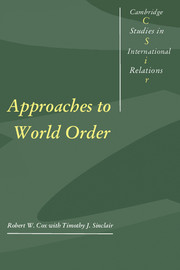Book contents
- Frontmatter
- Contents
- Preface
- Acknowledgements
- Part I Overviews
- Part II Theory
- Part III Interpretations
- Part IV Multilateralism
- 16 The executive head: an essay on leadership in international organization (1969)
- 17 Decision making (with Harold K. Jacobson) (1977)
- 18 Ideologies and the New International Economic Order: reflections on some recent literature (1979)
- 19 Labor and hegemony (1977)
- 20 Labor and hegemony: a reply (1980)
- 21 Multilateralism and world order (1992)
- 22 Globalization, multilateralism, and democracy (1992)
- Complete bibliography of works by Robert W. Cox to 1995
- Index of names
- Index of subjects
- CAMBRIDGE STUDIES IN INTERNATIONAL RELATIONS
21 - Multilateralism and world order (1992)
Published online by Cambridge University Press: 05 June 2012
- Frontmatter
- Contents
- Preface
- Acknowledgements
- Part I Overviews
- Part II Theory
- Part III Interpretations
- Part IV Multilateralism
- 16 The executive head: an essay on leadership in international organization (1969)
- 17 Decision making (with Harold K. Jacobson) (1977)
- 18 Ideologies and the New International Economic Order: reflections on some recent literature (1979)
- 19 Labor and hegemony (1977)
- 20 Labor and hegemony: a reply (1980)
- 21 Multilateralism and world order (1992)
- 22 Globalization, multilateralism, and democracy (1992)
- Complete bibliography of works by Robert W. Cox to 1995
- Index of names
- Index of subjects
- CAMBRIDGE STUDIES IN INTERNATIONAL RELATIONS
Summary
“World order” has become a current catchphrase of political discourse and journalism. “Multilateralism” has become something of a growth sector in academic studies. What current events have brought into prominence, scholarship has an obligation to subject to critical analysis. This essay raises some of the questions that should be probed in this analysis.
The two concepts are interrelated. Multilateralism appears in one aspect as the subordinate concept. Multilateralism can only be understood within the context in which it exists, and that context is the historical structure of world order. But multilateralism is not just a passive, dependent activity. It can appear in another aspect as an active force shaping world order. The agent/structure dilemma is a chicken-and-egg proposition.
To understand the potential for change that multilateralism holds, it is first necessary to place the study of multilateralism within the analysis of global power relations. I deliberately avoid using a term like “international relations” since it embodies certain assumptions about global power relations that need to be questioned. “International relations” implies the Westphalian state system as its basic framework, and this may no longer be an entirely adequate basis since there are forms of power other than state power that enter into global relations. “World order” is neutral as regards the nature of the entities that constitute power; it designates an historically specific configuration of power of whatever kind.
- Type
- Chapter
- Information
- Approaches to World Order , pp. 494 - 523Publisher: Cambridge University PressPrint publication year: 1996
- 5
- Cited by



